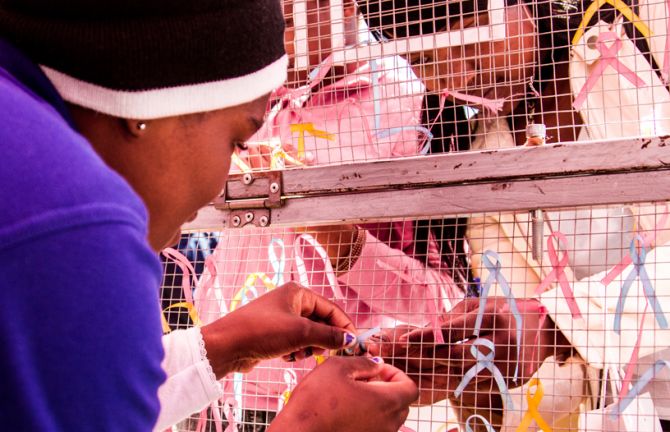

Feature Story
Investing in community advocacy and services to end the AIDS epidemic
04 April 2016
04 April 2016 04 April 2016Since the start of the AIDS epidemic civil society has been at the forefront of the response to HIV—demanding access to treatment and HIV services, calling for the respect of human rights and supporting community-led HIV services.
Today the role of civil society remains more relevant than ever as the success of community efforts in providing HIV services, particularly to key populations, is becoming more widely recognized as essential to ending the AIDS epidemic.
Community efforts have proven critical in overcoming many of the major challenges in the AIDS response, including reaching people most affected by HIV with life-changing HIV services, providing support for adherence to treatment and other essential health services. Civil society engagement has also been critical in advocating for new resources, improving HIV programming, and moving progress forwards on human rights issues.
Despite the wide recognition of the important role communities play in responding effectively to HIV, community organizations are facing severe financial challenges and many are closing their doors.
A total of 40% of organizations responding to a recent UNAIDS survey reported that their funding had decreased since 2013. Two thirds expected flat or reduced funding in the future. The decline in funding is resulting in a decline in community services—89% of those who reported a decrease in funding also reported they had to scale down their services as a result.
Greater investment in civil society and community-based service delivery is critical to the Fast-Track approach. Outreach to key populations in low- and middle-income countries should grow to about 7.2% of total investments by 2020, and the estimated resource needs for community-based delivery of antiretroviral therapy should grow to about 3.8% of total investment.
By 2020, investment in community mobilization should increase three-fold to 3% of total resources in low- and middle-income countries to help civil society represent the interests of communities affected by HIV, and to drive ambition, financing and equity in the AIDS response. Social enablers—including advocacy, political mobilization, law and policy reform, human rights, public communications and stigma reduction—should reach 6% of total expenditure by 2020.
UNAIDS has issued two new reports highlighting the importance of investing in community action. Invest in Advocacy details important contributions by community based advocates and points to the need to increase investment to drive an accelerated and more equitable response to HIV. It also notes that a report from the UNAIDS-Lancet Commission on Ending the AIDS Epidemic described advocacy as a “global public good” deserving of support commensurate with its importance.
Stronger Together provides details of the evidence base for community-provided services achieving scale, delivering quality services, and producing results. The report notes guidance from the World Health Organization and others calling for increased engagement of communities to provide a range of HIV and other health-related services.*
In order for community-led services to continue it is essential that international organizations, development partners, governments, private funders and other partners increase investment in community advocacy and services in order to continue and scale up HIV services.
The crucial role of community responses will be among the issues highlighted at the Civil Society Hearing taking place on 6 April in New York. The Hearing is part of the lead up to the United Nations High Level Meeting on Ending AIDS which will take place from 8 to 10 June at the UN headquarters in New York. At the hearing, civil society representatives from around the world will speak to UN Member States about major issues in the AIDS response, including the need for increased financing, leaving no one behind, integration, innovation, and partnering between governments, the private sector and communities.
* The new reports build on other recent publications, Communities deliver and Community-based ART delivery which include more details on the success of community responses.
Webcast
Watch the civil society hearing live on Wednesday 6 April from 10:00 EDT on webtv.un.org/



